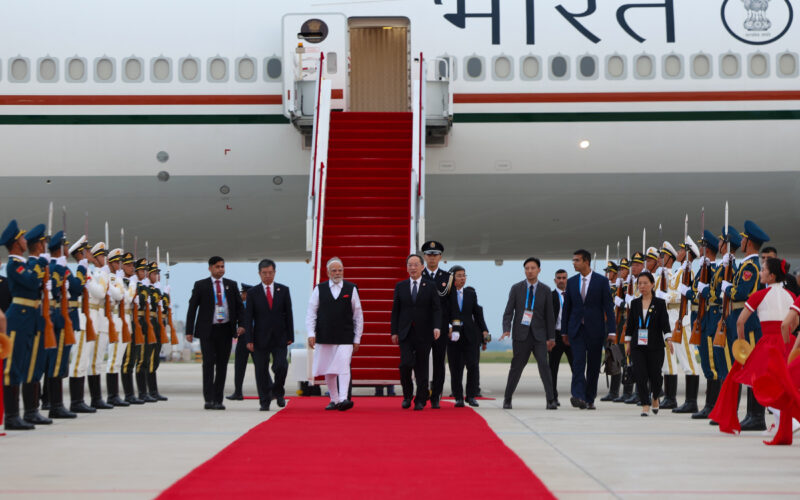#PMModiInChina #IndiaChina #SCO2025 #BorderPeace #DragonAndElephant #StrategicAutonomy #DigitalDiplomacy #GlobalSouth #AsiaLeadership #MultipolarWorld
Tianjin – Indian Prime Minister Narendra Modi arrived in Tianjin, China, on Sunday to attend the Shanghai Cooperation Organisation (SCO) Summit, marking his first visit to China in seven years. The high-profile trip, hosted at the invitation of Chinese President Xi Jinping, is seen as a critical step in resetting India-China ties amid major geopolitical and economic shifts.
The visit comes at a pivotal moment when India is recalibrating its foreign policy in the face of Western trade pressures and shifting alliances across Asia. Modi had just concluded his Japan tour before arriving in China, underlining New Delhi’s renewed focus on strengthening partnerships across East Asia.
Focus on Rebuilding Trust
During his bilateral meeting with President Xi Jinping, Prime Minister Modi reiterated that India remains committed to improving ties with China. He emphasized that the relationship should be built on “mutual trust, respect, and sensitivity,” while underlining the importance of creating an environment of peace along the disputed Himalayan border.
Modi made it clear that India and China should not allow their ties to be defined through the lens of a “third country,” a thinly veiled reference to growing U.S. pressure and the imposition of steep tariffs on Indian goods. Both leaders highlighted that their nations—two of the world’s oldest civilizations—have a responsibility to cooperate for regional and global stability.
President Xi echoed this sentiment, describing India and China symbolically as the “dragon and elephant,” and said it was the “right choice” for the two nations to come together as friends rather than rivals. The optics of the meeting, from ceremonial welcomes to joint statements, were carefully designed to show a thaw in relations.
Border Stability Takes Center Stage
A major agenda point was the India-China border situation, which has been tense since the Galwan Valley clashes of 2020. In recent months, however, disengagement at several flashpoints has reduced tensions. Modi stressed that border stability is the foundation for broader cooperation, while Xi agreed that the border issue should not overshadow other aspects of the bilateral relationship.
Both leaders agreed to activate mechanisms for confidence-building, enhance military-to-military dialogue, and prevent escalation. The consensus is expected to create a more stable environment that could allow economic and cultural engagement to grow.
Economic Cooperation and Trade Balance
Another highlight of the discussions was economic collaboration. India has long expressed concerns about its trade deficit with China, and Modi pushed for greater Chinese investments in India’s manufacturing and infrastructure sectors. The two sides discussed steps to ease market access for Indian goods, particularly in pharmaceuticals, agriculture, and IT services.
Xi, in turn, encouraged Indian participation in Chinese trade fairs and regional investment projects. The leaders also reviewed the resumption of direct flights, restoration of visas, and easing of trade restrictions, all of which had seen disruptions during the past years of strained ties.
SCO Summit: A Multipolar Moment
Beyond the bilateral meeting, Modi’s presence at the SCO Summit in Tianjin has drawn global attention. Leaders from Russia, Central Asia, and other member states are attending the summit, which is increasingly viewed as a counterbalance to Western-led blocs.
The agenda includes regional security, counter-terrorism, climate cooperation, and building stronger trade networks among member states. For India, participation in the SCO not only strengthens ties with China and Russia but also signals its commitment to playing a key role in shaping a multipolar global order.
Global Context and Strategic Autonomy
Modi’s visit is being seen as part of India’s effort to pursue strategic autonomy. With the U.S. recently imposing 50% tariffs on Indian imports, New Delhi is looking to diversify its partnerships and avoid over-dependence on any one power.
By visiting Japan first and then engaging China, Modi has sent a clear signal: India is willing to engage all major powers while safeguarding its own national interests. The message resonates with India’s long-standing principle of non-alignment, now reshaped into multi-alignment for the 21st century.
Challenges Ahead: Security and Trust Deficit
Despite the optimistic tone of the visit, challenges remain. Border trust is still fragile, and the memory of past clashes lingers. India has also been wary of China’s growing presence in South Asia through infrastructure investments and its close partnership with Pakistan.
Cybersecurity, trade imbalances, and competition for regional influence continue to be friction points. Experts caution that while the symbolism of Modi’s China visit is strong, the real test will be whether the goodwill translates into concrete outcomes such as reduced border tensions, balanced trade, and joint initiatives on global platforms.
Public Reaction and Diplomatic Signals
The visit has drawn mixed reactions at home and abroad. In India, many have welcomed Modi’s bold outreach as a sign of pragmatic diplomacy, while critics warn against being too optimistic given China’s track record on border commitments.
In China, state media highlighted Modi’s arrival as a “new chapter” in relations, portraying the visit as a diplomatic success for Xi as well. The red-carpet reception and extensive coverage signal that Beijing is keen on reshaping the narrative of India-China ties.
Conclusion: A Historic Reset?
Prime Minister Narendra Modi’s visit to China is more than a ceremonial stop at the SCO Summit—it represents a potential turning point in India-China relations. With both nations emphasizing partnership over rivalry, the visit may lay the foundation for a new phase of cooperation built on mutual trust and pragmatic engagement.
Yet, the path ahead is fraught with complexities. The ability of both sides to manage disputes while strengthening cooperation will determine whether this visit truly marks the beginning of a historic reset in one of the world’s most consequential bilateral relationships.
Hashtags:
#PMModiInChina #IndiaChina #SCO2025 #BorderPeace #DragonAndElephant #StrategicAutonomy #DigitalDiplomacy #GlobalSouth #AsiaLeadership #MultipolarWorld

